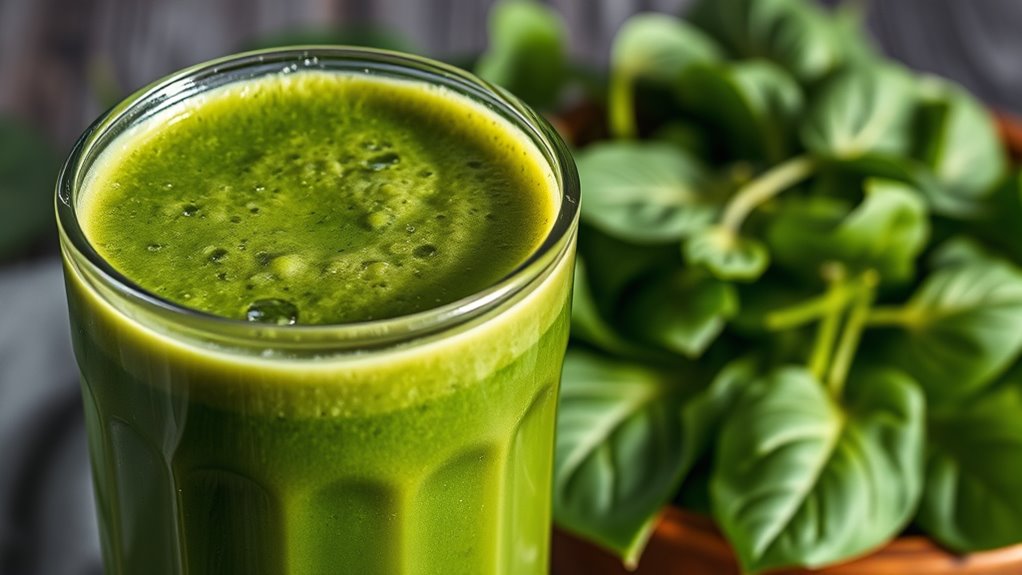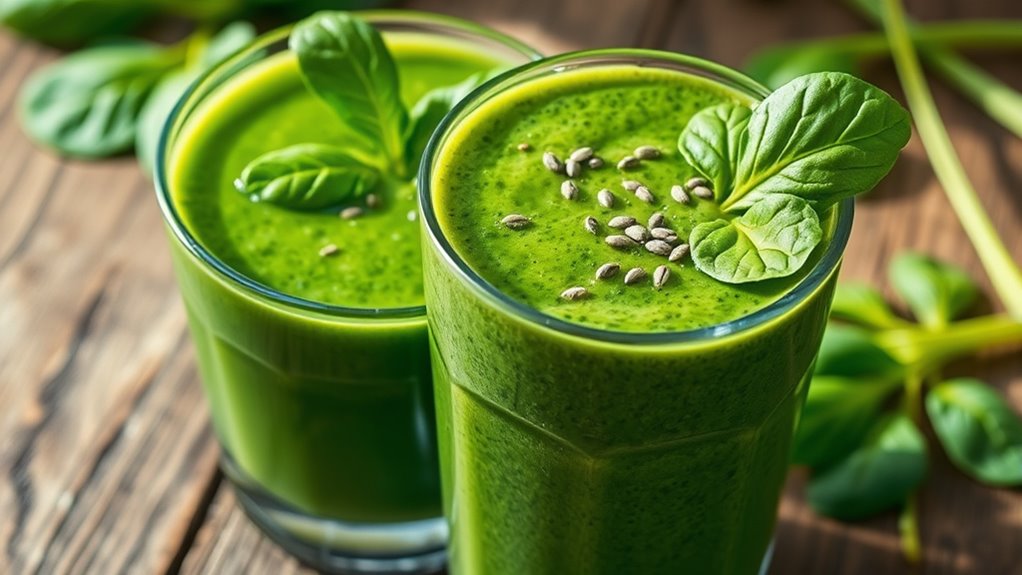You don’t need to fear spinach smoothies because, when eaten in moderation, the natural oxalates they contain aren’t a health risk for most people. Oxalates can bind with calcium and form crystals, but most individuals with a balanced diet and healthy kidneys won’t experience any problems. Proper cooking methods, like boiling, can also reduce oxalate levels. To understand how to enjoy your greens without worries, discover more about oxalates and your health.
Key Takeaways
- Oxalates are naturally occurring in spinach but generally pose no health risk to healthy vegans when consumed in moderation.
- Cooking spinach reduces oxalate levels, decreasing the risk of calcium binding and kidney stone formation.
- Most individuals can safely enjoy spinach smoothies without concern, provided they maintain a balanced diet and proper hydration.
- For those prone to kidney stones, limiting high-oxalate foods like spinach or ensuring adequate calcium intake is advisable.
- Proper diet management, including calcium intake and hydration, helps mitigate any potential health issues from oxalate consumption.

Have you ever wondered if oxalates are truly harmful or just misunderstood? It’s a common question among health-conscious vegans and anyone enjoying plant-based diets. Oxalates are naturally occurring compounds found in many vegetables, especially in spinach and other leafy greens. While they serve some plant functions, their presence has sparked concern over potential health risks, particularly oxalate toxicity. The main worry revolves around how oxalates interact with minerals like calcium, leading to calcium binding, which can interfere with nutrient absorption and contribute to kidney stone formation in susceptible individuals. But does eating foods high in oxalates automatically mean you’re risking your health? Not necessarily.
Oxalate toxicity occurs when your body accumulates too many oxalates, which can lead to health issues like kidney stones or, in extreme cases, damage to the kidneys. However, for most people consuming a balanced diet, oxalate levels from vegetables like spinach are unlikely to cause harm. The key factor is how your body handles these compounds. When you eat high-oxalate foods, oxalates can bind to calcium in your digestive tract, forming insoluble calcium oxalate crystals. This process, known as calcium binding, actually reduces the amount of calcium your body absorbs from your diet. While that might sound like a downside, it’s not a major concern for most individuals with healthy calcium intake and kidney function.
The misconception that oxalates are outright dangerous often leads to unnecessary fear, especially among vegans who rely on spinach smoothies and other leafy greens for vital nutrients. It’s true that people predisposed to kidney stones, particularly calcium oxalate stones, should monitor their oxalate intake. But for the average healthy person, eating spinach and other high-oxalate foods in moderation isn’t going to cause oxalate toxicity. Moreover, your body has mechanisms to handle oxalates efficiently. Hydration, proper calcium intake, and a varied diet all play roles in minimizing potential risks. If you’re worried, cooking spinach reduces oxalate levels substantially because heat breaks down some oxalates, making them less available to bind with calcium. Additionally, incorporating self-watering plant pots and other efficient gardening tools can help you grow fresh, nutritious greens at home, ensuring optimal freshness and nutrient retention.
Frequently Asked Questions
Can Cooking Reduce Oxalate Levels in Spinach?
Cooking methods can substantially reduce oxalate levels in spinach. When you boil or blanch spinach, the oxalates leach into the water, decreasing their content in the leaves you eat. To maximize oxalate reduction, discard the cooking water afterward. Steaming also helps, but boiling is most effective. So, if you’re concerned about oxalates, try boiling spinach before adding it to your smoothies or dishes.
Are There Any Health Benefits to Consuming Oxalates?
You might wonder if oxalates offer any health benefits, and while high oxalate intake can hinder nutrient absorption, moderate consumption may have some advantages. Oxalates can bind to minerals like calcium and magnesium, influencing nutrient interactions in your body. However, consuming oxalate-rich foods in balance helps prevent issues like kidney stones while still allowing you to enjoy their potential benefits, such as antioxidant properties.
How Do Oxalates Affect Kidney Health Long-Term?
Oxalates can impact your kidney health over time by contributing to kidney stone formation, especially if they accumulate in your system. When oxalate levels build up, they may combine with calcium to form stones, risking long-term damage. To protect your kidneys, it is crucial to moderate high-oxalate foods like spinach, stay well-hydrated, and consult with a healthcare professional if you’re prone to kidney issues.
Are All Vegans at Risk of Oxalate Buildup?
Not all vegans are at risk of oxalate buildup, but if you consume high-oxalate foods like spinach regularly, you might need an oxalate detox. Too much oxalate can hinder vegan mineral absorption and potentially cause health issues over time. To protect yourself, balance your diet with calcium-rich foods and stay mindful of your intake. This way, you support healthy mineral absorption and prevent unnecessary oxalate accumulation.
What Are Alternative Greens With Lower Oxalate Content?
If you’re looking for leafy greens with lower oxalate content, you should consider options like kale, collard greens, and bok choy. These greens provide essential nutrients without the high oxalate levels found in spinach. Switching to these alternatives can help you reduce oxalate buildup, especially if you’re concerned about kidney health or oxalate sensitivity, all while enjoying a variety of nutritious, plant-based options.
Conclusion
So, don’t let oxalates cast a shadow over your vibrant vegan journey. Spinach smoothies are like a rich, green symphony—full of life and health. Yes, oxalates are part of the story, but they’re not the villain. Think of them as tiny puzzle pieces in a big, beautiful picture. Embrace your greens with confidence, knowing that balance, variety, and a dash of mindfulness keep your wellness garden flourishing.










